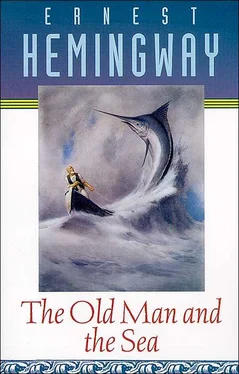“What do you have to eat?” the boy asked.
“A pot of yellow rice with fish. Do you want some?”
“No. I will eat at home. Do you want me to make the fire?”
“No. I will make it later on. Or I may eat the rice cold.”
“May I take the cast net?”
“Of course.”
There was no cast net and the boy remembered when they had sold it. But they went through this fiction every day. There was no pot of yellow rice and fish and the boy knew this too.
“Eighty-five is a lucky number,” the old man said. “How would you like to see me bring one in that dressed out over a thousand pounds?”
“I’ll get the cast net and go for sardines. Will you sit in the sun in the doorway?”
“Yes. I have yesterday’s paper and I will read the baseball.”
The boy did not know whether yesterday’s paper was a fiction too. But the old man brought it out from under the bed.
“Perico gave it to me at the bodega,” he explained. “I’ll be back when I have the sardines. I’ll keep yours and mine together on ice and we can share them in the morning. When I come back you can tell me about the baseball.”
“The Yankees cannot lose.”
“But I fear the Indians of Cleveland.”
“Have faith in the Yankees my son. Think of the great DiMaggio.”
“I fear both the Tigers of Detroit and the Indians of Cleveland.”
“Be careful or you will fear even the Reds of Cincinnati and the White Sax of Chicago.”
“You study it and tell me when I come back.”
“Do you think we should buy a terminal of the lottery with an eighty-five? Tomorrow is the eighty-fifth day.”
“We can do that,” the boy said. “But what about the eighty-seven of your great record?”
“It could not happen twice. Do you think you can find an eighty-five?”
“I can order one.
“One sheet. That’s two dollars and a half. Who can we borrow that from?”
“That’s easy. I can always borrow two dollars and a half.”
“I think perhaps I can too. But I try not to borrow. First you borrow. Then you beg.”
“Keep warm old man,” the boy said. “Remember we are in September.”
“The month when the great fish come,” the old man said. “Anyone can be a fisherman in May.”
“I go now for the sardines,” the boy said.
When the boy came back the old man was asleep in the chair and the sun was down. The boy took the old army blanket off the bed and spread it over the back of the chair and over the old man’s shoulders. They were strange shoulders, still powerful although very old, and the neck was still strong too and the creases did not show so much when the old man was asleep and his head fallen forward. His shirt had been patched so many times that it was like the sail and the patches were faded to many different shades by the sun. The old man’s head was very old though and with his eyes closed there was no life in his face. The newspaper lay across his knees and the weight of his arm held it there in the evening breeze. He was barefooted.
The boy left him there and when he came back the old man was still asleep.
“Wake up old man,” the boy said and put his hand on one of the old man’s knees.
The old man opened his eyes and for a moment he was coming back from a long way away. Then he smiled.
“What have you got?” he asked.
“Supper,” said the boy. “We’re going to have supper.”
“I’m not very hungry.”
“Come on and eat. You can’t fish and not eat.”
“I have,” the old man said getting up and taking the newspaper and folding it. Then he started to fold the blanket.
“Keep the blanket around you,” the boy said. “You’ll not fish without eating while I’m alive.”
“Then live a long time and take care of yourself,” the old man said. “What are we eating?”
“Black beans and rice, fried bananas, and some stew.”
The boy had brought them in a two-decker metal container from the Terrace. The two sets of knives and forks and spoons were in his pocket with a paper napkin wrapped around each set.
“Who gave this to you?”
“Martin. The owner.”
“I must thank him.”
“I thanked him already,” the boy said. “You don’t need to thank him.”
“I’ll give him the belly meat of a big fish,” the old man said. “Has he done this for us more than once?”
“I think so.”
“I must give him something more than the belly meat then. He is very thoughtful for us.”
“He sent two beers.”
“I like the beer in cans best.”
“I know. But this is in bottles, Hatuey beer, and I take back the bottles.”
“That’s very kind of you,” the old man said. “Should we eat?”
“I’ve been asking you to,” the boy told him gently. “I have not wished to open the container until you were ready.”
“I’m ready now,” the old man said. “I only needed time to wash.”
Where did you wash? the boy thought. The village water supply was two streets down the road. I must have water here for him, the boy thought, and soap and a good towel. Why am I so thoughtless? I must get him another shirt and a jacket for the winter and some sort of shoes and another blanket.
“Your stew is excellent,” the old man said.
“Tell me about the baseball,” the boy asked him.
“In the American League it is the Yankees as I said,” the old man said happily.”
“They lost today,” the boy told him.
“That means nothing. The great DiMaggio is himself again.”
“They have other men on the team.”
“Naturally. But he makes the difference. In the other league, between Brooklyn and Philadelphia I must take Brooklyn. But then I think of Dick Sisler and those great drives In the old park.”
“There was nothing ever like them. He hits the longest ball I have ever seen.”
“Do you remember when he used to come to the Terrace?”
“I wanted to take him fishing but I was too timid to ask him. Then I asked you to ask him and you were too timid.”
“I know. It was a great mistake. He might have gone with us. Then we would have that for all of our lives.”
“I would like to take the great DiMaggio fishing,” the old man said. “They say his father was a fisherman. Maybe he was as poor as we are and would understand.”
“The great Sisler’s father was never poor and he, the father, was playing in the Big Leagues when he was my age.”
“When I was your age I was before the mast on a square rigged ship that ran to Africa and I have seen lions on the beaches in the evening.”
“I know. You told me.”
“Should we talk about Africa or about baseball?”
“Baseball I think,” the boy said. “Tell me about the great John J. McGraw.” He said Jota for J.
“He used to come to the Terrace sometimes too in the older days. But he was rough and harsh-spoken and difficult when he was drinking. His mind was on horses as well as baseball. At least he carried lists of horses at all times in his pocket and frequently spoke the names of horses on the telephone.”
“He was a great manager,” the boy said. “My father thinks he was the greatest.”
“Because he came here the most times,” the old man said. “If Durocher had continued to come here each year your father would think him the greatest manager.”
“Who is the greatest manager, really, Luque or Mike Gonzalez?”
“I think they are equal.”
“And the best fisherman is you.”
“No. I know others better.”
“Que Va,” the boy said. “There are many good fishermen and some great ones. But there is only you.”
“Thank you. You make me happy. I hope no fish will come along so great that he will prove us wrong.”
Читать дальше












